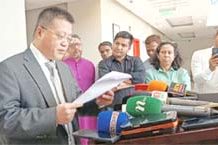C T Online Desk: State Minister for Foreign Affairs Shahriar Alam has said that Bangladesh contributes less than 0.47 per cent to global emissions. However, it is one of the most vulnerable countries to climate change and ranked seventh on the 2020 Global Climate Risk.
He made the remarks while taking part in a Webinar on “Climate Change and Migration and Displacement Nexus”.
Here is his full speech:
Thank you, Ambassador Mustafizur Rahman.
Mr. António Vitorino, Director-General of IOM,
Mr. Filippo Grandi, High Commissioner for Refugees,
Excellencies,
Ladies and gentleman,
Good evening from Dhaka.
It is my great pleasure to welcome you all to this virtual event. At the outset, I thank our Permanent Mission in Geneva for organising this event to highlight the importance of the nexus between climate change and migration and displacement. While I speak, thousands of people, especially in climate-vulnerable countries, are losing their homes and being displaced due to the adverse impacts of climate change.
Excellencies,
- Climate change is an existential crisis for people and the planet. It causes severe environmental degradation and affects agriculture, food, energy, health, infrastructure and economic security. These phenomena directly or indirectly jeopardise the lives and livelihood of climate-vulnerable communities, causing widespread displacement and migration within and across borders.
- According to the Global Report on Internal Displacement 2021, disasters triggered more than three-quarters of the new displacements recorded worldwide in 2020. And more than 98 per cent of disasters resulted from weather-related hazards. It is also estimated that approximately 143 million people would be internal climate migrants by 2050. Among these, 40 million alone would be in South Asia, and one-third of this would be in Bangladesh.
Distinguished guests,
- Bangladesh contributes less than 0.47 per cent to global emissions. However, it is one of the most vulnerable countries to climate change and ranked seventh on the 2020 Global Climate Risk. Due to its unique geographic location, Bangladesh often experiences extreme weather events that result in loss of lives, lands, homes and livelihoods and eventually forced displacement of people across the country. Sea level rise, increasing salinity and river erosion force people in Bangladesh to become internal climate migrants. The 42 million people living in 19 coastal districts of Bangladesh are under severe threat from climate change. A one-meter rise in sea level could inundate one-fifth of Bangladesh. We are forced to create shelters and housing for our internal climate migrants, as they are being uprooted from their homes.
- Moreover, sheltering the 1.1 million forcibly displaced Rohingyas from Myanmar has taken enormous toll on the ecology of the Cox’s Bazar region of Bangladesh.
Excellencies,
- Under the visionary leadership of the Hon’ble Prime Minister Sheikh Hasina, Bangladesh has emerged as a global leader in climate change adaptation despite these constraints. We are the first LDC to set up the Climate Change Trust Fund from our own resources. As of now, nearly 443 million dollars have been disbursed from the Fund to support more than 800 adaptation and resilience building-related projects. The regional office of the Global Center on Adaptation (GCA) for South Asia has also been established in our capital Dhaka which is promoting and disseminating the collective regional efforts for accelerating locally-based climate adaptation mechanisms.
Distinguished audience,
- Climate change manifests grave injustice and violation of human rights. People’s right to home, food, health, water, education as well as rights to life and self-determination are greatly hampered when they are displaced from their usual habitation. We all know that Loss and Damage and climate induced migration and displacement are intricately interrelated. However, sadly, progress on the discussion on Loss and Damage and climate refugees remains severely inadequate. As such, we need to commence discussion on the creation of an appropriate framework to address the needs of climate refugees.
- Bangladesh as the Chair of the 55-Member Climate Vulnerable Forum (CVF) has constantly raised the issue of displacement of climate-vulnerable communities in different regional and international forums.
Ladies and gentlemen,
- We need to remember that vulnerable developing countries’ adaptive capacities are limited. Regrettably, climate financing remains severely under-resourced. In such a scenario, I would like to put forward the following suggestions:
First, we must be strict to the implementation of the Paris Agreement;
Second, climate change and related disasters must be addressed in the context of international development cooperation, and the developing countries must be supported in their adaptation efforts;
Third, G7, G20 and other major economies need to come forward to provide finance, adequate resources and technology support to the most vulnerable countries to address the climate related vulnerabilities and challenges;
Fourth, the 2030 Agenda for Sustainable Development Goals, the Paris Agreement and the Sendai Framework must be implemented in their true spirit to address the root causes of climate induced migration and displacement; and,
Finally, a strict adherence to UN Global Compact for Safe, Orderly and Regular Migration (GCM) is required to ensure international support for climate migrants.
Before I conclude, I would like to thank the distinguished speakers and panellists for joining the webinar. I look forward to an interactive panel discussion.














